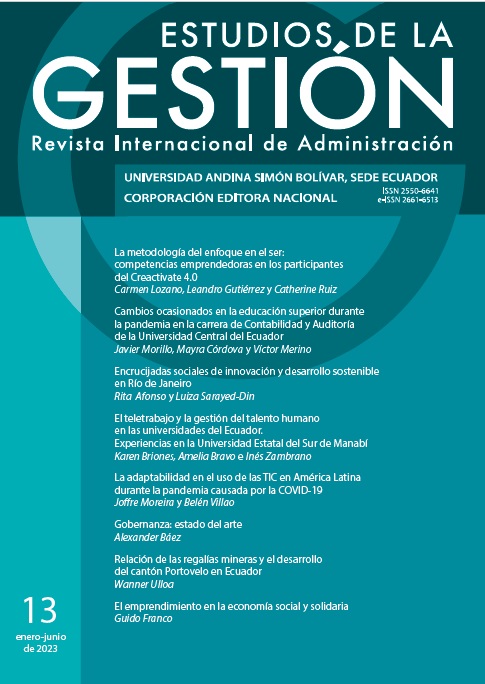Changes in Higher Education During the Pandemic in the Accounting and Auditing Program of the Central University of Ecuador
DOI:
https://doi.org/10.32719/25506641.2023.13.2Keywords:
Higher Education, COVID-19, Technology, skills, accountingAbstract
The objective of this research is to identify the challenges and opportunities presented in higher education due to the COVID-19 pandemic, specifically for the Accounting and Auditing program of the Universidad Central del Ecuador. A survey containing open
and closed questions was applied to a sample of 3974 students that consisted of several components: the teacher’s methodological work, the evaluation system, the technological problem, the social relationship and the learning environment. The survey included
a descriptive analysis of the subjects of the basic, formative and professionalizing areas, and provided important contributions that helped us to better understand the problem. Interesting data were revealed about economic opportunities for students because they received classes in this modality; however, there were challenges regarding access and availability of technological equipment. Finally, the research highlighted the need to ensure an adequate learning management platform, as well as constant training of teachers to strengthen innovative capabilities in their learning methodologies.
Downloads
References
Arias, Leonel, y Liliana Portilla. 2009. “El papel del docente frente en la enseñanza del proceso contable”. Scientia et Technica 15 (42): 121-124. https://bit.ly/3z8oE9k.
BID. 2020. La educación superior en tiempos de COVID-19: Aportes de la segunda reunión del diálogo virtual con rectores de universidades líderes de América Latina. Washington D. C.: BID. https://bit.ly/3PuKF7H.
Castro, Alejandro. 2018. La educación superior del Ecuador. Quito: Instituto Superior Tecnológico Bolivariano de Tecnología.
CEPAL. 2020a. América Latina y el Caribe ante la pandemia del COVID-19: Efectos económicos y sociales. Santiago: CEPAL / OPS. https://bit.ly/3PfEoxc.
---. 2020b. La educación en tiempos de la pandemia de COVID-19. Santiago: CEPAL. https://bit.ly/3yLTgfu.
EC Consejo de Educación Superior. 2019. Reglamento de Régimen Académico. Gaceta Oficial del Consejo de Educación Superior (CES), 21 de marzo. https://bit.ly/3o7l7C2.
EC Ministerio de Educación. 2022. “Ecuador mejoró su sistema educativo en los últimos 7 años”. Accedido 15 de julio. https://bit.ly/3IGKa8l.
Engen, Bård-Ketil. 2019. “Comprendiendo los aspectos culturales y sociales de las competencias digitales docentes”. Comunicar 61: 9-19. https://doi.org/10.3916/c61-2019-01.
Gómez, Martha, Leticia Contreras y Delia Gutiérrez. 2016. “El impacto de las tecnologías de la información y la comunicación en estudiantes de ciencias sociales: Un estudio comparativo de dos universidades públicas”. Innovación Educativa 16 (71): 61-80.
http://www.scielo.org.mx/pdf/ie/v16n71/1665-2673-ie-16-71-00061.pdf.
González, Teresa, y Alejandra Cano. 2010. “Introducción al análisis de datos en investigación cualitativa: tipos de análisis y proceso de codificación (II)”. Nure Investigación 45: 1-10. https://bit.ly/3INUCen.
IESALC. 2020. COVID-19 y educación superior: de los efectos inmediatos al día después. París: UNESCO. https://bit.ly/3PuEL6K.
Instituto Nacional de Estadística y Censos (INEC). 2017. Tecnologías de la información y comunicación: ENEMDU-TIC 2017. INEC. https://bit.ly/2kAIFlC.
---. 2020. ENEMDU-2020. Accedido octubre de 2021. https://www.ecuadorencifras.gob.ec/enemdu-2020.
Jácome, Giselle. 2020. “Empresas y trabajadores: entre los más impactados por el coronavirus en Ecuador”. Voz de América. 4 de mayo. Accedido noviembre de 2021. https://www.voanoticias.com/coronavirus/coronavirus-ecuador-desempleo.
Jiménez, Ana, y María del Rocío Rodríguez. 2016. “Comunidades de aprendizaje: propuesta de desarrollo y sostenibilidad desde la educación social en instituciones educativas”. Cuestiones Pedagógicas 25: 105-118. https://bit.ly/3ATFJp8.
Karim, Musa, Shumaila Furnaz, Ahmed Raheem Buksh, Muhammad Asim Beg, Muhammad Shahbaz Khan y Bushra Moiz. 2019. “Sample Size Calculation in Medical Research”. MACS 2019 - 13th International Conference on Mathematics, Actuarial Science, Computer Science and Statistics, Proceedings 2 (8): 217-224. https://doi.org/10.1109/MACS48846.2019.9024807.
Maida, Andrea, y Gisela Pérez. 2011. “La formación del criterio profesional del contador y su importancia en el campo laboral”. Trabajo de investigación, Universidad Nacional de Cuyo, Mendoza. https://bit.ly/3ATFtX6.
OCDE. 2007. Reviewing the ICT Sector Definition: Issues for Discussion. Documento de trabajo. Accedido septiembre de 2021. http://www.oecd.org/internet/ieconomy/20627293.pdf.
Ordorika, Imanol. 2020. “Pandemia y educación superior”. Revista de la Educación Superior 49: 1-8. https://tinyurl.com/y74jpvdn.
Ron, Rafael. 2015. “Utilización de normas de contabilidad en el Ecuador”. ResearchGate. Accedido septiembre de 2021. https://bit.ly/3OcXJxo.
Sumba, Ruth, Génesis Saltos, Cindy Rodríguez y Zereida Tumbaco. 2020. “El desempleo en el Ecuador: causas y consecuencias”. Polo del Conocimiento 5 (10): 774-797. https://bit.ly/3zbeViS.
UNESCO. 2013. Enfoques estratégicos sobre las TIC en educación en América Latina y el Caribe. Santiago: UNESCO.
https://unesdoc.unesco.org/ark:/48223/pf0000223251.
Yaguache, Dunia, Rolin Puma y Jorge Moncayo. 2015. “La contabilidad y la normativa”. Revista SurAcademia 3: 19-29. https://bit.ly/3APD1kb.
Wyman, Harold. 1990. “El poder y la importancia de la contabilidad: ayer, hoy y mañana; cómo fue, cómo es y cómo debería ser”. Revista Española de Financiación y Contabilidad 19 (62): 9-25. https://www.jstor.org/stable/42779995.












